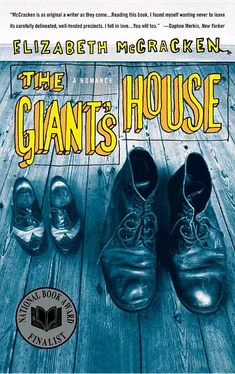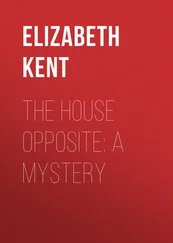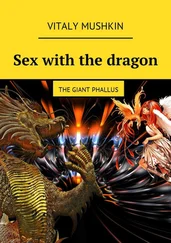“The rest?” I said.
He turned to me. “He’s been writing me awhile now. Don’t tell Aunt Caroline. They’re not speaking.”
I waited for some explanation.
“Where is your father?”
“Different places.”
Now I sighed. I said aloud, to myself, “Take a hint, Peggy.”
James smiled. “Yes,” he said. “Then it’s unanimous. Please. Por favor .”
For a favor, yes, I did take a hint, I didn’t ask. The most I was allowed — we agreed on this without discussion — was to inquire whether Mr. Sweatt had recently written. The answer was usually no. And though of course I would have loved to have read those misguided missives, I also understood: James needed whatever little personal life he could get, and his correspondence was pretty much it. This included whatever the hated mysterious Mr. Sweatt had to say, wherever he was, and why he did not sign that postcard love , or Dad, why he was so stingy he felt his first initial was enough for his son. This was the only information I had on him, and it fascinated me. James would not tell me anything else, and I would not ask.
One woman visited every day of her vacation. Her husband had come the first day, James told me, but after that she arrived alone. One night when I dropped over after work she was sitting there, in the chair I favored.
“Hiya,” she said to me.
She was a young woman with skinny freckled arms and bad skin. For a second I thought she was a leftover school friend. Most of the teenagers had graduated from school that May and had already moved to the first cities of their new lives. But I looked closer at the woman and saw she was older than that, in her twenties. She smiled wide; her teeth looked like a pack of cards in midshuffle.
“Hi, Peggy,” said James. “This is Patty Flood.”
“We’ve been talking all afternoon,” she said. “My husband, he’s off at the beach. He loves the ocean, but we live out in Montana and he never gets to see it. Me, I could care less. A lot of water, salty, what’s the big deal?”
I shrugged. “We like it,” I said.
“Oh, I like the ocean too,” she said quickly. “It’s beautiful. I just already know it’s there, don’t have to check on it every day. The ocean doesn’t make conversation. That’s what I like better than the beach. People .”
“You don’t have those in Montana?” I said.
“Not enough of them,” she said. “So, are you out here on vacation?”
“No,” I said. I hated being mistaken for a tourist. “I live here.”
“Lucky you,” she said. “But lucky me, too. Montana’s beautiful. The whole country’s beautiful, each part in its own way.”
Patty Flood and her good mood were starting to get on my nerves. Her mood was so good it was almost a physical thing, a monkey on a leash that she let leap all over the furniture, delighting only its owner. “But the best part of the trip,” she said, looking at James, “is meeting this young man! You are about the most interesting person I ever met. Don’t you think?” she asked me.
I smiled at James, who looked pained. “Of course,” I said.
Somebody knocked at the door. “More visitors!” said Patty Flood, as if she’d moved in as hostess. But it was only Oscar.
“Dinner’s ready, Jim,” he said.
Patty Flood didn’t budge. “Hey, Oscar,” she said. “Remember me?”
“I remember you, Patty,” he said. “It’s only been since yesterday.”
“Well,” said Patty. “You guys are eating dinner, huh?”
“Yes,” said Oscar. Still it took Patty a while to will herself to her feet, gather her purse, and walk out the door.
“Montana?” Oscar said, after Patty Flood finally left. “Nobody lives in Montana .”
Oscar was a good New Englander, of course: once upon a time we were all of the country, and suddenly two hundred years later there’s this coarse swollen thing stuck to our back calling itself the United States.
“Delaware who?” Oscar would ask, confronted by history.
If you grow up around here you start to believe that somehow all American history previous to 1776 occurred in Massachusetts. If someone had asked me, at age eight, to name the thirteen colonies, I would have started, “Boston, Plymouth, Salem, Lexington, Concord …”
“That woman’s here every day,” Oscar said to me. “I don’t know how Jim can stand her.”
“She’s lonely,” said James.
“She’s got her husband. Tell her to bother him.”
“Oh, Don ,” James said, disgusted. “He just makes her lonelier.”
“Some people are like that,” I said, knowing that was true but unsure of whether I was one of them.
“Most people are,” said James.
I ran into Patty Flood the next afternoon when I was outside on my park bench, eating some tragic sandwich I’d assembled from odds and ends out of my fridge — sliced apple, some cheese, pickle relish. Single people eat sadly — they cobble together things left from shopping trips based on dreams of all the meals they’d fix for themselves, all the ways they’d treat themselves to something grand; those dreams, for me, died by the next day and, despite my best hopes, I wanted only canned hash and apples. Dogged by practicality, I had to use everything I’d bought anyhow.
“Hey!” said Patty Flood. She sat down next to me. Her dress was white, with yellow and red polka dots. She looked like a well-dressed clown.
I nodded at her and bit into my sandwich.
“I was just going to go see Jim,” she said. “You wanna come with?”
“I have to go back to work.”
“Right.” She laughed. “When I’m on vacation I think the whole world is.” She hooked her elbows over the back of the bench. “I was gonna bring something to Jim, to cheer him up. What would?”
“What makes you think he needs cheering up?”
She looked surprised. “Boy, you aren’t paying attention. He’s a real nice, real sad guy. I never met anyone who needs more cheering up. If I could, I’d take him to an amusement park or something. But if Mohammed can’t come to the mountain—”
“James isn’t the amusement park kind,” I said. I regarded my sandwich; it looked like an ottoman with the stuffing leaking out. “I do pay attention.”
Patty Flood nudged my calf with the toe of her shoe. “Maybe you need to go to an amusement park. There’s one out Nantasket, I hear. Nothing wrong with you a good roller coaster wouldn’t fix.”
I resisted the urge to kick her back. Library patrons walked up the path, past the bench; some of them smiled, some didn’t seem to recognize me without the circulation desk around my waist.
“There’s nothing wrong with me at all,” I said to Patty Flood. “Roller coaster or no roller coaster.”
“Listen.” Her voice got soft and personal. “I know you. I know you better than you think I do—”
“What’s my name?” I stared at her, sure she did not remember. I wanted to quite literally strike her quite literally dumb.
But Patty Flood laughed. “Oh, ma’am,” she said, “that’s one detail I don’t know. But I know you’re someone who thinks she’s smart just ’cause she’s miserable. And I know you think I’m a fool. I used to be like you: smart and sad. Then I found Jesus Christ, and I’m dumb and happy.”
“Ah, well,” I said. My sandwich was falling apart in my hands; I tried to put it in some kind of order. “Jesus Christ. That would explain things.”
“Yeah.” Patty smiled. “He explains everything. Back when I was like you, back when I was so intelligent , I thought that was my job, to explain everything. And you know what? That’s God’s job. Without God, there’s no explanation, not for the smallest, most meaningless puzzle. No wonder I was desperate: I was looking for nothing! My husband’s like you. A lotta people are, billions. Y’all think you feel deeply just because you feel miserable . But here’s the thing: happiness is deep, and so is faith. There’s a lot of perfectly good emotions besides despair.”
Читать дальше












